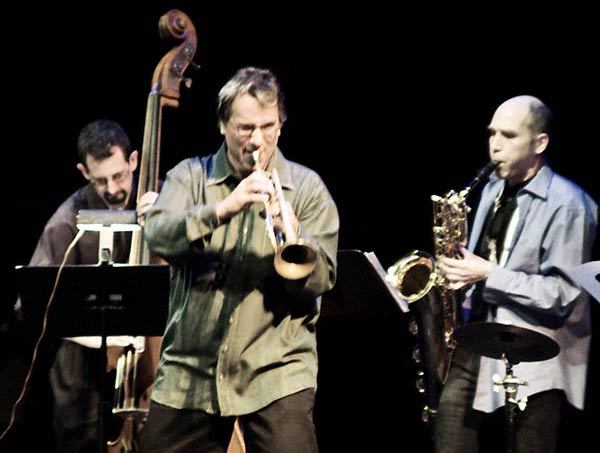| Instruments arranged in a half moon on the stage gleam in the spotlights: Piano, Bass, Drum, Trombone, Trumpet, Baritone, Tenor and Soprano Saxes, and three Clarinets. The stage goes dark, ghostly outlines of musicians appear by their instruments; what sounds like an old recording of a ‘nign’ or ‘tune’ comes over the P.A. system-“ya-ba bye bye bye”; the bass played arco sets up a deep drone, and the trumpet wails out a high pitched melody. The voice of tenor David Wall asks the question: “When do Jews sing? When they’re hungry. Which means always. The nigun feeds this spiritual hunger.” The lights come up and the Flying Bulgar Klezmer Band segues into the next number. This one has the pianist, Marilyn Lerner, sobbing loudly while the two lugubrious clarinets weep and the vocalist wails about the financial troubles of the band, in this theatrical presentation of “rockin’ traditional sounds from the Jewish Diaspora.” Out of the darkness and the lamenting come sounds of musical self-mockery, and we are beginning to have some fun. By the end of the concert, you could understand why Chagall portrayed his klezmer floating off the ground in a space of no gravity. |
|
The band performs a long program of 25 numbers, many of them introduced with a recitation of the English translation of the Yiddish lyrics set as poems. Many of the tunes start slow and blue, deep in misery, and kind of work their way out of it as the mariachi trumpet of leader David Buchbinder signals the ensemble into a kind of Bauhaus oompah oompah don’t-give-a-damn end-of-the-world cabaret gaiety. The audience was happy, and stayed for multiple encores, but this was not a program of Jewish wedding and bar-mitzvah music, and though the band asked for and got a lot of audience handclapping, it was not an evening at the pub. The Flying BKB are very serious musicians in classical, jazz, bluegrass and new music genres. Several, like Buchbinder and reedman Robert Stevenson are composers of note. The melodies are arranged in complex, polyphonic harmonies over a fairly basic one-two beat, often with strange shifts in rhythm and tempo. Baritone sax and Victor Bateman’s double bass keep time in place of absent drummer Daniel Barnes. Special guests, Stephen Donald (trombone) and the hyper-rockin’ Peter Lutek, a reedman and new music improv specialist added to the richer texture of the band’s new sound. David Wall, who has an entertaining way of conducting while he sings, and of listening to the band when he’s not singing, slides up the register from tenor to countertenor with ease, and delivers a convincing Yiddish in a variety of accents from ‘Galicianer’ to ‘Litvak’.
What does this music express? We are told from the stage that the ‘nign’ is feeling stammering into language the way the sounds of an infant reach out towards its parents. It is the language of infancy we return to as we search for a vehicle to send our expression into dimensions of thought beyond our familiar spaces. The Flying Bulgars send this sound out on wings feathered with funk, r&b, latin, free jazz and newly discovered material from the Archive of Jewish Music in the Ukraine. Though it seems to celebrate the ghostly memory of of European Jewry, you can hear that this music has been made to live, and to grow on the spot.
|


